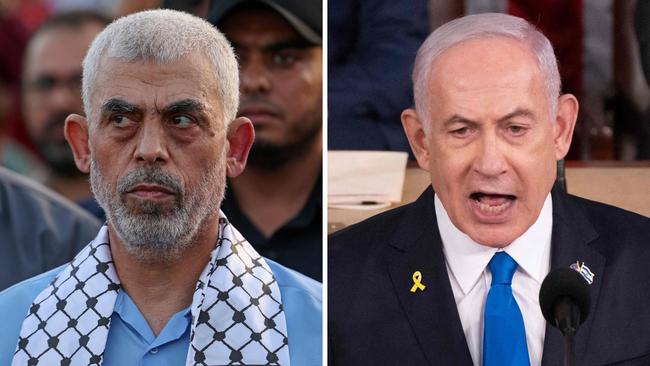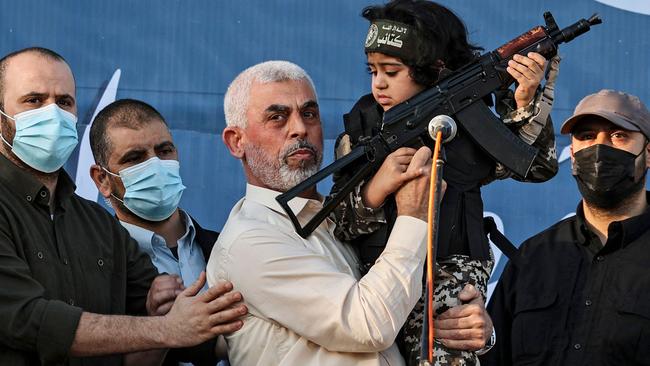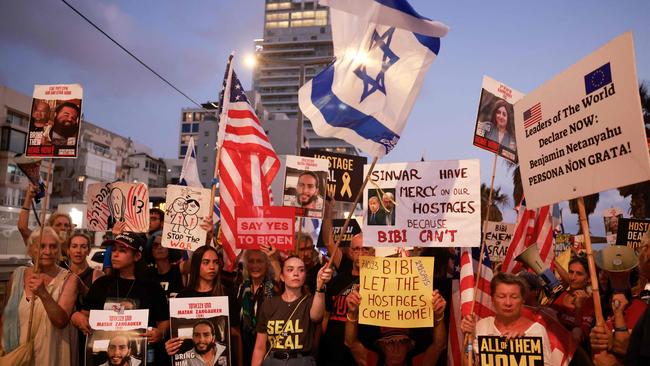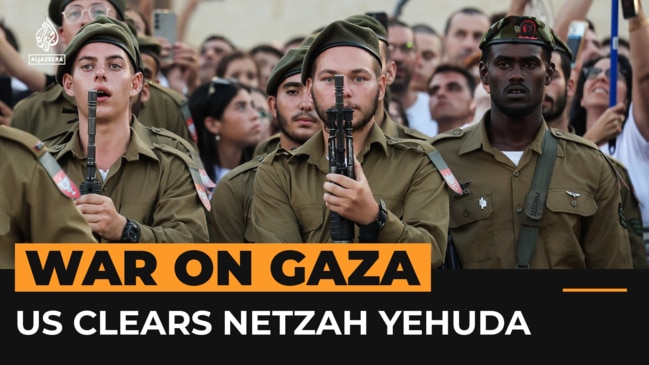Gaza ceasefire’s biggest obstacles are Israel’s and Hamas’s leaders
Israel’s own security establishment is openly questioning Netanyahu’s willingness to do a deal at the peace talks in Doha, while Hamas under Sinwar’s leadership is refusing to participate.

US hopes of closing a ceasefire deal for Gaza that could help calm tensions in a region on the brink of a wider war are running into a basic snag – everyone seems to agree it is time to stop the fighting, except for the two people who will have to sign off on it.
Israeli Prime Minister Benjamin Netanyahu and Hamas leader Yahya Sinwar have resisted an agreement for months, negotiators and officials in their own camps say, even as pressures to strike a deal have been growing.
The death toll in the Gaza Strip edged above 40,000 people Thursday, according to Palestinian health officials, whose numbers don’t say how many are combatants. Israel’s security establishment says that it has decimated Hamas and that the time is right to cut a deal to bring home the more than 100 hostages still held in the enclave, saying those still alive may not be able to survive much longer.
The Biden administration, meanwhile, is hoping a deal would give Iran and allied militias like Hezbollah a reason to back down from their threat to retaliate against Israel for a pair of killings in Beirut and Tehran.
Yet the mood among the negotiators is worse than ever. Israel’s own security establishment is openly questioning Netanyahu’s willingness to do a deal. Meanwhile, Hamas under Sinwar’s newly anointed leadership is refusing to participate in the talks. President Biden, who has been persistently optimistic, said Tuesday, when asked about the odds of a deal, “It’s getting harder.”
“I don’t think you can breach the very deep gap between these two,” Michael Milshtein, a former head of Palestinian affairs for Israeli military intelligence, said of Netanyahu and Sinwar. “Unfortunately, they are the number one decision makers on both sides.”

The hard-line positioning could be an attempt by Netanyahu and Sinwar to skew the terms of a deal their way as it grows closer. But as the weeks drag on without progress, the standoff is frustrating not only the battered civilians of the Gaza Strip and the families of Israeli hostages still held there, but also the Egyptian and Qatari interlocutors trying to bring the combatants to a deal.
The tension got so bad during the last round of talks, in July, that when Israel’s negotiating team brought up Netanyahu’s new demands for securing strategic corridors in Gaza, Egyptian intelligence chief Abbas Kamel lost his temper.
A visibly angry Kamel told his team that Netanyahu was wasting his time, according to people familiar with the matter.
It is from that point that the parties are starting again.
Netanyahu has said he is working to achieve Israel’s war goals of defeating Hamas and returning the hostages. Hamas official Sami Abu Zuhri rejected the allegations that the group has resisted an agreement, saying that it is committed to the negotiation path, but rejects the new conditions Israel has put forward.
An Israeli delegation including spy chief David Barnea and internal-security chief Ronen Bar met Thursday in Doha, Qatar’s capital, with Central Intelligence Agency Chief William Burns, White House Middle East co-ordinator Brett McGurk and Qatari Prime Minister Mohammed bin Abdulrahman al-Thani as part of the two-day U.S.-led summit to try to bridge the gaps to a deal. Hamas officials didn’t attend but are expected to be updated on their progress in real-time by mediators, according to Egyptian officials.
Sticking points remain for a deal that would see a ceasefire and the exchange of Palestinian prisoners held by Israel for the release of hostages held by Hamas. They include whether any halt to fighting would be temporary or become permanent, how to secure the border between Gaza and Egypt, Israel’s ability to screen Palestinians returning to northern Gaza and which Palestinian prisoners would be approved for release.
In a sign that significant differences remain, a senior Egyptian official said on Thursday evening, local time, that the negotiations in Doha would continue “amid attempts to bring viewpoints closer together.” “The Egyptian security delegation is making intensive efforts to reach a consensus between the parties,” the official said. “The gaps between the parties remain wide.”

Netanyahu for months has faced accusations from mediators and his own negotiators that he has frustrated efforts to reach an agreement by introducing new demands, leaking details to the media and limiting his team’s room to negotiate. Members of his team have even contemplated quitting, according to Arab mediators and a former negotiator.
“Our feeling all the time was that he was oppositional towards us,” said a former negotiator, referring to Netanyahu. “I’m very certain the chances of reaching a deal would be much higher if he wasn’t there.” Netanyahu has previously denied accusations of hindering the talks. On Wednesday, ahead of the summit, an Israeli official said Netanyahu insisted that Israeli troops must remain in the Philadelphi corridor, the 9-mile (14.4km) border zone between Egypt and Gaza. That position is anathema to Hamas and goes against the recommendations of Israel’s security establishment, which has said it isn’t necessary.
Sinwar, who as Hamas’s Gaza chief is believed to have engineered the Oct. 7 attack on Israel that left 1,200 people dead and around 250 taken hostage, took over the U.S.-designated terrorist group after his predecessor was killed last month in Tehran and is showing signs of hardening his stance.
In a message conveyed to Arab mediators Monday night, Sinwar said that if Israel was serious about negotiations and wanted Hamas to participate, it must stop its military operations in Gaza first, the mediators said, something that Israel is unlikely to agree to. Sinwar believes the latest round of talks is a bluff, granting additional time for Israel to wage its military campaign, according to Arab mediators.
Netanyahu has set a goal of what he calls total victory over Hamas. He has continued to stick to the objective even as military officials have publicly said that it isn’t realistic and that a deal to return the hostages is more urgent.

Israeli Defense Minister Yoav Gallant pushed back against Netanyahu’s idea of “total victory,” a concept questioned by many security analysts, during a committee session in the Israeli parliament on Monday. Netanyahu’s office responded by saying that “total victory” is the clear directive of the prime minister and the cabinet, and “is binding on everyone – including Gallant.” The prime minister’s governing coalition depends on far-right ministers who have prioritised defeating Hamas over releasing the hostages. Finance Minister Bezalel Smotrich and National Security Minister Itamar Ben-Gvir have signalled that they would leave Netanyahu’s coalition if the prime minister agrees to a ceasefire under conditions they oppose.
Sinwar, who is believed to be hiding in Gaza’s underground tunnels, has also represented a major challenge to the talks. Egyptian officials have said in recent months that Sinwar believes Hamas currently has the upper hand in negotiations, pointing to internal political divisions within Israel and U.S. pressure on Israel to do more to alleviate suffering in Gaza.
Divisions have also emerged within Hamas, with Sinwar often representing a more hard-line approach. In May, the group’s political wing abroad showed flexibility in negotiations about a ceasefire and hostage release, Arab mediators said. But Sinwar, whose approval is needed for any deal, has remained more defiant and more reluctant to end the war just yet, according to the mediators.
The Wall Street Journal has reported, based on dozens of messages the Hamas leader has transmitted during the negotiations, that Sinwar believes that Palestinian civilian deaths work to his advantage by drawing international condemnation of Israel.
Sinwar has repeatedly stopped communicating with mediators and Hamas leadership for days at a time throughout the war, something that is likely to slow down and complicate negotiations which he now officially leads. In March, Sinwar cut off communications with Hamas’s leadership due to mistrust and belief there was a spy in their ranks, according to Arab mediators following the killing of Marwan Issa, deputy commander of Hamas’s military wing.
Meanwhile, families of hostages feel helpless as talks continue without result. “These are the worst days of my life,” said Jonathan Dekel-Chen, father of U.S.-Israeli citizen Sagui Dekel-Chen, 36, who was kidnapped by militants from a kibbutz in southern Israel on Oct. 7. His son was last seen wounded but alive in a tunnel under Gaza by hostages who were released in a ceasefire deal in November.
Dow Jones





To join the conversation, please log in. Don't have an account? Register
Join the conversation, you are commenting as Logout